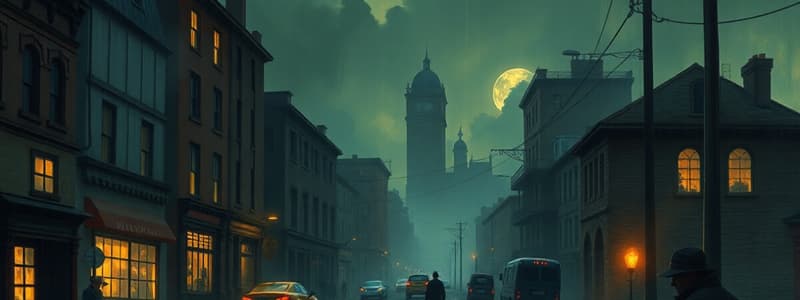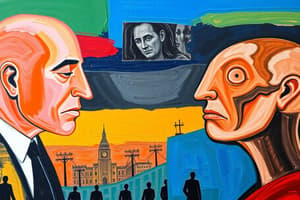Podcast
Questions and Answers
What does the 'Emerald City' symbolize in the film?
What does the 'Emerald City' symbolize in the film?
- A representation of governmental support
- A metaphor for economic stability
- A place of ultimate happiness
- The illusion of a fulfilling life (correct)
Which character best represents the common worker in the film?
Which character best represents the common worker in the film?
- Dorothy
- The Scarecrow (correct)
- The Cowardly Lion
- The Tin Man
What is a significant aspect of Dorothy's journey?
What is a significant aspect of Dorothy's journey?
- Challenging the political status quo (correct)
- Finding her way back home
- Seeking revenge on the Wizard
- Acquiring wealth and power
How does the film portray the concept of government through the Wizard?
How does the film portray the concept of government through the Wizard?
What does the film suggest about reliance on personal effort during economic hardship?
What does the film suggest about reliance on personal effort during economic hardship?
Which character symbolizes marginalized skills in the film?
Which character symbolizes marginalized skills in the film?
What underlying theme is presented through the film's portrayal of a romanticized agrarian past?
What underlying theme is presented through the film's portrayal of a romanticized agrarian past?
How does the film address social and political pressures on citizens?
How does the film address social and political pressures on citizens?
What role does the Cowardly Lion play in the social and political commentary of the film?
What role does the Cowardly Lion play in the social and political commentary of the film?
What does the journey toward a better life reflect in the context of the film?
What does the journey toward a better life reflect in the context of the film?
Flashcards
Economic Hardship in "The Wizard of Oz"
Economic Hardship in "The Wizard of Oz"
The movie subtly critiques the tough economic conditions faced by many people during the Great Depression. Its characters' struggles with poverty, unemployment, and financial insecurity show this. Their journey towards a better life reflects the widespread American desire for economic stability and opportunity.
Social and Political Disparity in "The Wizard of Oz"
Social and Political Disparity in "The Wizard of Oz"
The movie portrays a critique of the social and political structures, particularly focusing on the gap between the wealthy and the impoverished. The Scarecrow, representing the ordinary worker, the Tin Man representing marginalized skills, and the Cowardly Lion representing the vulnerable voice, collectively depict a segment of the population that felt ignored and inadequately represented by the political discourse.
False Hope in "The Wizard of Oz"
False Hope in "The Wizard of Oz"
"The Wizard of Oz" uses the "Emerald City" as a representation of false hopes linked to economic well-being. The city's allure, signifying a utopian economic solution, ultimately turns out to be an illusion.
Political Manipulation in "The Wizard of Oz"
Political Manipulation in "The Wizard of Oz"
Signup and view all the flashcards
Vulnerability in Political Landscape
Vulnerability in Political Landscape
Signup and view all the flashcards
Ineffective Leadership in "The Wizard of Oz"
Ineffective Leadership in "The Wizard of Oz"
Signup and view all the flashcards
Resilience in "The Wizard of Oz"
Resilience in "The Wizard of Oz"
Signup and view all the flashcards
Contrasting Time Periods in "The Wizard of Oz"
Contrasting Time Periods in "The Wizard of Oz"
Signup and view all the flashcards
Social Inequality in "The Wizard of Oz"
Social Inequality in "The Wizard of Oz"
Signup and view all the flashcards
Economic Themes in "The Wizard of Oz"
Economic Themes in "The Wizard of Oz"
Signup and view all the flashcards
Study Notes
Economic Themes
- The film subtly critiques the economic hardship faced by many during the Great Depression. The characters' struggles with poverty, unemployment, and financial insecurity are poignant examples. The journey toward a better life reflects the American desire for economic stability and opportunity.
- The "Emerald City" can be interpreted as a symbol of false promises related to economic prosperity. The allure of the city, representing a utopian economic solution, ultimately turns out to be a mirage.
- The characters' reliance on their own resources and efforts to overcome adversity mirrors the self-reliance and resilience required during the Depression. The Wizard represents both the false hope and the real potential for human ingenuity.
- The film's nostalgic portrayal of a romanticized agrarian past contrasts with the industrial realities of the time. The characters' escape from a harsh economic environment to a vision of stability suggests a complex yearning for a simpler time.
Political Commentary
- "The Wizard of Oz" provides a political allegory related to the anxieties of the time about corruption and ineffective leadership. The Wizard, lacking true power, represents the perceived distance and detachment of the government. This symbolic portrayal could be seen as criticism of perceived political ineptitude or manipulation influencing the public.
- The story embodies a critique of the social and political structures, especially in relation to the disparity between the wealthy and the poor. The Scarecrow representing the common worker, the Tin Man representing marginalized skills, and the Cowardly Lion representing the vulnerable voice, together represent the population that felt overlooked and underrepresented by the political discourse.
- The film's portrayal of Dorothy, an innocent person, travelling to a strange land, challenges the political status quo and symbolizes the vulnerability and lack of agency of many Americans during challenging times. She represents the average person who has little to no political power and is thrust into a difficult situation.
- The oppressive forces within the realm represent the social and political pressures on citizens to conform and surrender to those in authority, albeit with dishonest intentions. It subtly critiques the systems that lead to the sense of helplessness and subservience.
- The Scarecrow's desire for a brain, the Tin Man's desire for a heart, and the Cowardly Lion's desire for courage embody the human need for wisdom, empathy, and strength. These themes carry political undertones through their implications for the collective and individual needs during a time of economic and political uncertainty. The film subtly implies that society needs to address these collective human needs to truly thrive.
Studying That Suits You
Use AI to generate personalized quizzes and flashcards to suit your learning preferences.




